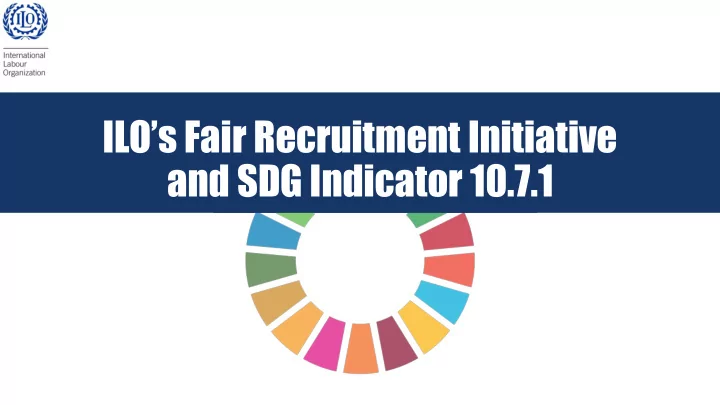

ILO’s Fair Recruitment Initiative and SDG Indicator 10.7.1
ILO’s Fair Recruitment Initiative • Help prevent human trafficking • Protect the rights of workers, including migrant workers, from abusive and fraudulent practices during the recruitment and placement process • Reduce the cost of labour migration and enhance development gains 29/11/2017 Jesse Mertens, mertensj@ilo.org 2
ILO’s Fair Recruitment Initiative • Equal treatment in employment and working conditions • Bilateral agreements to insulate employment contracting from influence of intermediaries • Increase labour market information • More scope for direct recruitment • Rules requiring transparency in transactions • Minimize regulations and red tape, including through online / e- governance processes • Impose adequate penalties to prevent abuse • Zero recruitment fees and related costs for workers 29/11/2017 Jesse Mertens, mertensj@ilo.org 3
Target 10.7 10.7 Facilitate orderly, safe, and responsible migration and mobility of people, including through implementation of planned and well- managed migration policies • Indicator 10.7.1 Recruitment cost borne by employee as a proportion of yearly income earned in country of destination (Tier 3) • Indicator 10.7.2 Number of countries that have implemented well-managed migration policies (Tier 3) • Indicator 10.c By 2030, reduce to less than 3% the transaction costs of migrant remittances and eliminate remittance corridors with costs higher than 5% (World Bank) 29/11/2017 Jesse Mertens, mertensj@ilo.org 4
Building the evidence base Measuring SDGs on labour migration and recruitment • ILO Global estimates on migrant workers (2015) • ICLS Resolution IV (2013) concerning further work on labour migration statistics • Experts working group to define international standards on labour migration statistics. Main tasks: • Recommend statistical concepts and definitions • Contribute to 2018 ICLS discussion on global international concepts and standards • ILO/WB surveys on labour migration and recruitment costs • Technical meeting of experts on the definition of recruitment costs • ILO/World Bank co-custodians to develop methodology and testing for measuring SDG 10.7.1 on recruitment costs 29/11/2017 Jesse Mertens, mertensj@ilo.org 5
Measuring recruitment costs KNOMAD key findings • Migration corridors matter • High cost items vary by origin country • Gender matters • High recruitment costs do not necessarily reflect high wage differentials between origin and destination countries • Hidden costs can arise varying by working conditions and occupations • Loans increase migration costs 29/11/2017 Jesse Mertens, mertensj@ilo.org 6
Measuring recruitment costs Absolute and per-month recruitment costs per corridor Source: Gurung, G. et al. New insight on SDG 10.7.1. (Presentation 2017) 29/11/2017 Jesse Mertens, mertensj@ilo.org 7
Survey strategy and sampling • representative samples (or sampling frames) of migrant workers in either countries of origin or destination • the choice of a survey strategy • e.g. surveys of workers in their place of employment, • general household surveys, • traveller surveys while travelling, at ports of entry or exit • the replicability of a given survey approach • comparability between survey waves and countries of origin and destination • and the means with which a survey is regularly implemented 29/11/2017 Jesse Mertens, mertensj@ilo.org 8
Substantive issues • the length and substance of questionnaires to be used • the scope of recruitment costs • the choice of sectors and corridor for which to conduct the survey • Coverage in migrant characteristics: • Low skilled migrant workers / sector specific? • Short term and/or long term? • Migrants admitted past 3 years? • Regular or irregular? • the reference period on which workers are asked to report 29/11/2017 Jesse Mertens, mertensj@ilo.org 9
Thank you Fair Recruitment Initiative http://www.ilo.org/global/topics/forced- labour/publications/WCMS_320405 General Principles and Operational Guidelines on Fair Recruitment http://www.ilo.org/global/topics/fair-recruitment/WCMS_536755 29/11/2017 Jesse Mertens, mertensj@ilo.org 10
Recommend
More recommend